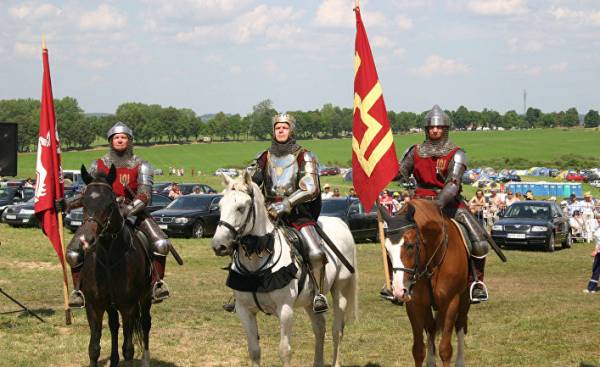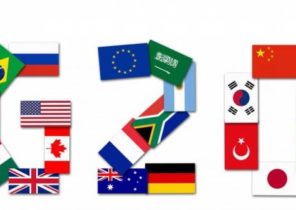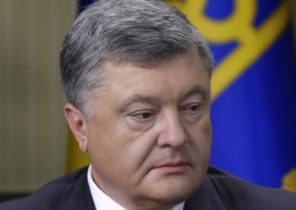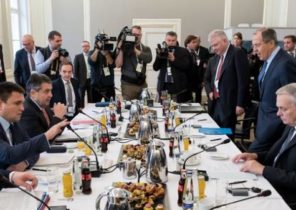
To appreciate the importance and value of great battles and battles, in historical retrospect is extremely difficult, as, for all their Gore and cruelty, that they were born and declared himself the nation.
So, on 18 June 860, the first time was declared by Ruska nation has taken under the leadership of the Kievan princes Askold and dir Constantinople. And on 10 August 955 in the battle of the river Lech, where the combined German forces, led by king Otto I defeated the invading in Central Europe the Hungarians, became the birthday of the German nation.
The battle of Grunwald on 15 July 1410 was not the day of the birth of Polish, Lithuanian or Ruthenian nation, and gave the world a new nation of the winner. It was a significant event, or even the Foundation for the Union of Slavic States of the Kingdom of Poland and the Grand Duchy of Lithuanian and Ruthenian, whose forces met in battle with the Teutonic knights.
No special meaning to parse the events of that battle, and strategic and tactical moves of the parties. The battle took place, the Slavs resisted and defeated the Teutonic knights, who were now obliged to pay them indemnity. Everything seemed to be simple and clear, but not for all.
So on the website of the Russian military-historical society. In the header of the site where you can find the words of Putin:
“The country should be heroes, and people should know them. It should be the benchmarks in the examples which today’s generation would be educated and educate their children. It is very important”!
In the framework of the project “Memorable Dates of Military History”, the material 03.07.2014 established a new memorable date of Russian military history:
“25 July — Memorable date of Russian military history. On this day in 1410 the Russian troops and their allies defeated the German knights in the battle of Grunwald”.
Note the wording: “Russian troops and their allies.” Neither “the Kingdom of Poland and allied Russian troops” nor of the Union of Polish, Lithuanian and Russian troops”, and it highlighted important challenges in the first place “Russian” and their allies, the name of the Nations which are not even worthy of mention!
Bullshit. But rather should be seen as important and necessary for istorikomatematicheskie, pseudo-Patriotic propaganda machine of the Kremlin, as it solves several problems in the mythology of the “Third Rome” and immediately takes living in captivity Moscow tales Everyman far from the truth.
So why the Kremlin is another’s victory?
Why “the Third Rome” so desperately clings to every mention of “Russian” and “translate on itself the arrows?”
But the thing is that Moscow as “Third Rome”, the sacred center of the Orthodox Caliphate, is extremely important battles with different kinds of crusaders-Catholics. As such references reinforce the myth of Russia — the protector of the Slavic and Orthodox world from so definitely he was unorthodox and extremely Orthodox Catholic contagion. It is for the same and for no other reason, so sung in Muscovy feat Horde of sycophants Nevryuya Alexander Nevsky, to whom is attributed the heroic victory over the Teutonic knights in less than fabulous “ice battle.”
But this is not the most important. There is one terrible secret, forcing the Kremlin mountain historians throw all mention of Ruska and then to rewrite. And it’s not even about vanity and bragging natural Muscovites. And not even in an attempt to attribute other people’s achievements, and far more terrible fact: in the theft.
Note: Muscovy, which Russia, in fact Russia never was. But Russia never gave up, always developing or explaining all known events of Ruthenian history as part of the historical heritage of Muscovy. That, as you well know, is not true.
Russia, as such, at the time of its formation was not just big and strong government, but power that received its Ruthenian Metropolitanate. King Yaroslav the Wise, Tsar of Russia Yaroslav, not just I, continued my father, to complete the Cathedral of Wisdom — the Hagia Sophia, the true, the enduring value of the Christian world. But also set the foundations for a new Russian state, creating a set of laws “Ruska Pravda”. And, crucially, put the Ruthenian Metropolitan Hilarion, not considering it necessary to align his appointment with the Byzantine Empire. Actually brought Yaroslav in 1051 Rus on a new orbit, declaring its full independence as a secular and ecclesiastical authority.
After his reforms, Russia is fully consistent with the Christian Canon that “the Church needs to be their king, and the king should be above the Church.
Lower the century of civil wars and move immediately to the consequences of the Mongol invasion, which, as we say in Moscow, Kiev was deposed and lost his weight in the Christian world. That, as you well know, the truth does not match. Kiev has not ceased to be the capital city or spiritual center of the Ruthenian faith. Note it is the Ruthenian, not Orthodox and not Orthodox and not Greek. Why? Yes, because under Yaroslav in Kiev began to write books in the Slavonic language: Ruthenian, and hence faith Ruska through books and her Holy fathers and in Novgorod and Polotsk. The Ruthenian faith began and the Lithuanians and the poles, and Ruthenians, not Nations or peoples. It therefore stood regiments in the battle of Grunwald of Ruthenians and Lithuanians, and United by their faith alone: Ruska. There was then no “Russian”, as such people never existed. And the term “Orthodoxy” emerged only in the late XVII century, after the final absorption of Moscow Ruthenian Church.
“O K”! — tell you. — “Why, then, call themselves the princes of Moscow and Russian tsars that whim this? And the idea of “Holy Russia” as it is more from Moscow came, than from Kiev?”
Yes, that’s right. Indeed, Moscow impostors, starting with Ivan the terrible, writing a myth about the relationship with the Kievan princes, which was erected by his family to the Roman Emperor Octavian Augustus, began to call themselves Ruska country Kings, for the countries of the West. And AK Khan (White King) or Emperors, successors of Genghis Khan, for the countries of the East. That, as you well know, reality correspond with the middle of the half. And by the time of the battle of Grunwald irrelevant data claims Moscow impostors was not.
Into 1410 the year the Moscow rules Vasili, the son of a faithful vassal of the king of the Horde Tokhtamysh — Dmitry Donskoy, nothing in history is not particularly noted. GDL (Grand Duchy of Lithuania — approx. ed.) the rules are much more historically significant and important politician Vytautas, who was by religion…. Ruthenian!
But this is not interesting. What is important is that the Moscow Prince Vasily in 1410, was a tributary of the Tartar king Timur-Kutlug, who, along Temnik Edigei defeated Tokhtamysh, who had fled to Vytautas. That is why in 1410 in the ranks of the allied troops were also made by detachments of the Horde a number from one to three thousand, mostly horsemen, led by Khan Jalal ad-DIN, son of Khan Tokhtamysh.
And here from Moscow in the ranks of the allied forces representatives were not, as that would risk the Prince of Moscow to enter into an Alliance with the enemies of the Horde.
But in the ranks of the allies was 51 Polish squadrons under the command of king Jagiello, a total population of about 20 thousand soldiers, of whom 9 were banners with the Ruthenian lands, namely: Lviv, Chelm, Przemysl, Galicia, Podolia, Tarnów, Belza. And 2 banners of Czech mercenaries led by Jan Hawk.
The army of the Grand Duchy of Lithuania, Rus and Samogitia was headed by Grand Duke of Lithuania Vytautas. The army consisted of 40 banners and had a total population of about 12 thousand soldiers.
The army of Duke Vytautas was composed of units from: Podillya, Kiev, Starodub, Lutsk, Vladimir, Lutsk, Brest, and Smolensk.
As you can see, among the allies there were no representatives of Muscovy. Not a single person sent a tributary hordes of the enemy on to Moscow to help the truly Slavic, and truly brotherly peoples, which United, could defeat a much more powerful opponent.
It is very important to understand that the victory in the battle of Grunwald the poles, not Lithuanians and not Rusyns. Not won it not the Catholic poles and Lithuanians Ruska Rusyns. It was a Union, a collective victory, which is important and needed part of each.
And therefore any speculation on it is not appropriate, as inappropriate attempt who boast of their false victories of Moscow once again to tell the world about what she was formidable, and what it worst enemy of Catholicism and the West.







